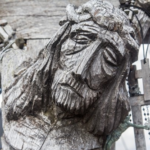We run our website the way we wished the whole internet worked: we provide high quality original content with no ads. We are funded solely by your direct support. Please consider supporting this project.

The Cross is Revelation and Salvation
The way Christ saved us from the curse of the law was “by becoming a curse for us” (Gal. 3:13). So too, the way Christ freed us from the condemnation of sin and enabled us to “become the righteousness of God” was by becoming sin for us (2 Cor. 5:21). Getting this point is crucial to understanding my argument in Crucifixion of the Warrior God and the forthcoming Cross Vision (Due out August 15). What is more, since the curse of the law includes enslavement to “the elemental spiritual forces of this world” (Col. 2:20), we may add that the way Christ freed us from the fallen powers was by voluntarily identifying with our enslavement to the powers. This self-sacrificial act “canceled the charge of our legal indebtedness which stood against us and condemned us,” for by this means God “disarmed the powers and authorities” and “made a public spectacle of them, triumphing over them on the cross” (Col. 2:14-15; 1 Cor. 2:8; 1 Jn.3:8).
God reveals the perfect love that God eternally is as Father, Son, and Spirit by humbly condescending in his relationship with us. God’s love was most definitively revealed in his greatest condescension, which occurred on Calvary when God stooped to become what is antithetical to himself—viz. our sin and our curse. God’s triune unity was most perfectly revealed when Jesus, out of love for humankind, experienced God-forsakenness on the cross, for God’s unity is other-oriented love, and for the Son of God to experience God-forsakenness on behalf of fallen humanity is its supreme expression. We could sum up this point by saying that the greatest act of God’s condescension, and therefore the act that constitutes his fullest self-revelation, took place when God humbly and self-sacrificially entered into self-negation.
Combining this point about the revelation of God’s love with the opening paragraph on how Jesus saved us, we can see that the loving self-negation that was God’s supreme self-revelation was also the means by which God saved us from the curse of the law and rescued us from the oppression of Satan and the fallen powers. This is no coincidence, for revelation and salvation are inextricably bound up with one another. God saves us by revealing his true self to us, and he reveals his true self to us by saving us. Both are accomplished by God stooping to take on the “strange” and ‘alien” semblance of a God forsaken, law-cursed, criminal on Calvary. In other words, God’s supreme revelation, as well as our salvation, both take place by means of God’s loving self-negation.
This correlation between revelation and salvation should not surprise us, for going back to the garden when humanity first fell, our alienation from God and bondage to Satan has been most fundamentally rooted in the false picture of God the serpent tempted us with (Gen. 3). We are alienated from God primarily because we are deceived about God’s perfect character and thus cannot trust him. This is why it is no coincidence that the one who finally reveals what God is really like is also the one who saves us from our bondage to the powers. The revealed “Word” is the” Savior,” and he’s the one precisely because he’s the other, and both roles culminated when God experiences other-oriented self-negation, becoming our sin, our curse and our bondage on Calvary.
Photo credit: decafinata via Visualhunt.com / CC BY-SA
Related Reading

Sermon Clip: How Christians Should Respond to Ferguson
In this clip from this weeks sermon, Greg Boyd comments on how Christians should respond to the events in Ferguson St. Louis and how that response should always be in love and to help heal both sides. The full sermon is here: http://whchurch.org/sermons-media/sermon/heart-smart-qa

How God Changes the World
God’s hopes for us began before the creation of the world. And what God intended from the beginning gives us insight into how God works to bring about what he intends. In the first chapter of Ephesians, Paul teaches that God “chose us in [Christ] before the creation of the world to be holy and…

What Power Do You Trust?
Governments and nations have always relied on fighting to survive. They punish criminals who threaten their welfare. They go to war against enemies who attack their borders or stand in the way of their agenda. This is how the kingdoms of the world maintain law and order and advance their causes. By contrast, the Kingdom…

From Good Friday to Easter
This weekend as you contemplate the suffering, death and resurrection of Jesus, we pray that God will reveal his unfathomable love for you in new ways. Blessings to all of you from all of us at ReKnew. Photo credit: Claudio via Visualhunt / CC BY

Do the Gospels Fabricate Prophetic Fulfillment?
Skeptically-inclined scholars, and especially critics of Christianity, frequently argue that the Gospel authors created mythological portraits of Jesus largely on the basis of OT material they claim Jesus “fulfilled.” In other words, they surveyed the OT and fabricated stories about how Jesus fulfilled those prophecies. In response, it’s hard to deny that there are certain…

Greg and N.T. Wright at the Missio Alliance Gathering!
The Missio Alliance North American Gathering will be held April 27-29 in Alexandria, Virginia. The theme this year is Awakenings: The Mission of the Spirit as the Life of the Church. Featured speakers this year include Jorge Acevedo, Greg Boyd, Ruth Padilla Deborst, Tammy Dunahoo, Todd Hunter, Dr. Charles A. Montgomery, Jr., Cherith Nordling, Rev. Dr. Howard-John…
